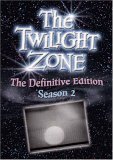| Reviews & Columns |
|
Reviews DVD TV on DVD Blu-ray 4K UHD International DVDs In Theaters Reviews by Studio Video Games Features Collector Series DVDs Easter Egg Database Interviews DVD Talk Radio Feature Articles Columns Anime Talk DVD Savant Horror DVDs The M.O.D. Squad Art House HD Talk Silent DVD
|
DVD Talk Forum |
|
|
| Resources |
|
DVD Price Search Customer Service #'s RCE Info Links |
|
Columns
|
|
|
Twilight Zone - Season 2 (The Definitive Edition), The
INTRODUCTION:
"You're traveling through another dimension, a dimension not only of sight and sound, but of mind; a journey into a wondrous land whose boundaries are that of imagination. That's the signpost up ahead -- your next stop, the Twilight Zone!"
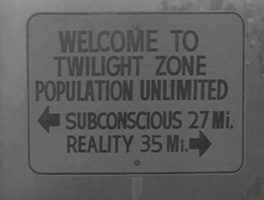
In October of 1959, Rod Serling forever enhanced the television landscape by exposing the audience to the full range of his unique and creative imagination. Fueled by his considerable writing talent and produced by Buck Houghton, the Cayuga production team had put together 36 half-hours of entertainment unlike anything else ever on the air. While not a huge ratings hit, the effort was profitable and received new sponsorship along with a renewal from CBS. After a successful Summer award season that added further validity to the series, Serling and company set out to accomplish one of the most difficult tasks in the industry: avoiding the dreaded sophomore slump. Featuring classics like "The Eye of the Beholder" and "The Invaders", Image Entertainment follows up one of the best DVD releases of 2004 with the "definitive" edition of this second season of the landmark series.
CONTENT:
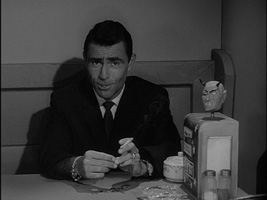 Following the success of its inaugural season, the second season of The Twilight Zone exhibited a few notable changes. First, and most obvious, was the replacement of Bernard Herrmann's haunting title music with the now classic theme from Marius Constant. This new theme would be attached to the series for the rest of its run and, in the coming years, would become its single most identifying feature. Another notable change was the introduction of Rod Serling as an on-screen narrator. It was a clever change, and one that required some real creativity on the parts of the directors, as Serling was not simply filmed before a backdrop at another time, but he had to be worked into the opening scenes themselves. An example of an effective introduction can be found in "Nick of Time" where the two lead characters sit together in a booth at a diner. The camera, focused intently on the couple, whips around 180 degrees to reveal Serling sitting comfortably in the opposite booth as he narrates the scene. It was an interesting technique that over the course of the series would sometimes prove more effective than others.
Following the success of its inaugural season, the second season of The Twilight Zone exhibited a few notable changes. First, and most obvious, was the replacement of Bernard Herrmann's haunting title music with the now classic theme from Marius Constant. This new theme would be attached to the series for the rest of its run and, in the coming years, would become its single most identifying feature. Another notable change was the introduction of Rod Serling as an on-screen narrator. It was a clever change, and one that required some real creativity on the parts of the directors, as Serling was not simply filmed before a backdrop at another time, but he had to be worked into the opening scenes themselves. An example of an effective introduction can be found in "Nick of Time" where the two lead characters sit together in a booth at a diner. The camera, focused intently on the couple, whips around 180 degrees to reveal Serling sitting comfortably in the opposite booth as he narrates the scene. It was an interesting technique that over the course of the series would sometimes prove more effective than others.
In total, there were 29 episodes produced for this season, a curious drop of 7 from the first. In addition to the decreased number, 6 of these episodes were produced on videotape instead of film as an attempt by the network to save money. Serling would later admit that the results of this experiment were "disastrous", an assessment with which I wholeheartedly agree. As he was contracted for about 80% of the episodes, once more the writing burden fell predominantly on the shoulders of Serling, and he was credited with 20 of the season's episodes, beginning with the premiere, "King Nine Will Not Return".
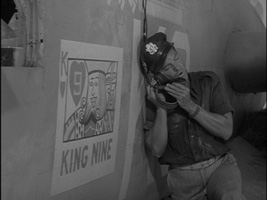 "King Nine" opens the season in a manner incredibly similar to the previous season's "Where is Everybody?". Robert Cummings stars as a marooned World War II pilot who awakens on an African beach next to his crashed B-25. Unable to recall how he came to be in this position, he becomes increasingly disturbed by the fact that his crew (or their bodies) are nowhere to be found. Like the aforementioned "Where is Everybody?", this episode is essentially a one-man show, and Cummings is very effective in the role. Unfortunately, the episode plays as a second chance of sorts, an attempt to remake the previous season premiere with different results. In "Where is Everybody?", Earl Holliman continuously talks to himself as a device for advancing the story, a method that all parties agreed was a bit flawed. With "King Nine Will Not Return", the device has changed to having most of the lead character's dialogue presented as a voice-over narration. The other major change to the story is in the final act. While "Where is Everybody?" is a story that is constructed in a compelling manner where no suspension of disbelief or outside force is required, "King Nine" goes out of its way to add an unnecessary reference to the supernatural. This very thing was argued during the original episode (with Ferris possibly bringing a theater stub back with him), and it was rightfully determined that the show would be more effective without such a gimmick, but Serling was never satisfied with this conclusion, and it seems clear that this season's premiere is largely an attempt to present almost the same story with results more to his liking. On its own, it would probably be more successful, but in this context, I find it lacking.
"King Nine" opens the season in a manner incredibly similar to the previous season's "Where is Everybody?". Robert Cummings stars as a marooned World War II pilot who awakens on an African beach next to his crashed B-25. Unable to recall how he came to be in this position, he becomes increasingly disturbed by the fact that his crew (or their bodies) are nowhere to be found. Like the aforementioned "Where is Everybody?", this episode is essentially a one-man show, and Cummings is very effective in the role. Unfortunately, the episode plays as a second chance of sorts, an attempt to remake the previous season premiere with different results. In "Where is Everybody?", Earl Holliman continuously talks to himself as a device for advancing the story, a method that all parties agreed was a bit flawed. With "King Nine Will Not Return", the device has changed to having most of the lead character's dialogue presented as a voice-over narration. The other major change to the story is in the final act. While "Where is Everybody?" is a story that is constructed in a compelling manner where no suspension of disbelief or outside force is required, "King Nine" goes out of its way to add an unnecessary reference to the supernatural. This very thing was argued during the original episode (with Ferris possibly bringing a theater stub back with him), and it was rightfully determined that the show would be more effective without such a gimmick, but Serling was never satisfied with this conclusion, and it seems clear that this season's premiere is largely an attempt to present almost the same story with results more to his liking. On its own, it would probably be more successful, but in this context, I find it lacking.
Sadly, "King Nine" is not the only episode that is strikingly similar to another from the preceding season. "The Lateness of the Hour" stars Inger Stevens (previously in "The Hitch-Hiker") as the daughter of a reclusive inventor who has staffed his home with a host of robot servants. The title of the episode is itself rather curious, since it doesn't particularly relate and yet immediately reminds the viewer of "The After Hours", an episode with virtually the same concept and much better execution. Where Stevens was very effective as the road-weary traveler in "The Hitch-Hiker", her performance in this episode is shrill and annoying. In her defense, however, she is probably the best part of the episode, as nearly everything about it is a complete failure, particularly the dreadfully annoying performance of Irene Tedrow as her mother. "The Lateness of the Hour" is the first of the 6 videotaped episodes, and it is an early sign that the videotape experiment was a terrible idea. Not only are the audio and video quality horrible, but the attempt to stage a dynamic show like The Twilight Zone within the confines of a four-camera "live" environment does considerable damage to even the potentially successful scripts. Of this particular episode, director Jack Smight says, "I don't think that the plot was that good really, but when we were rehearsing it, we were working on the atmosphere more than anything else."
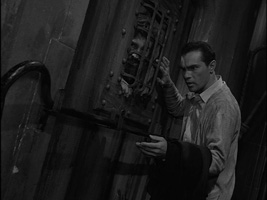 While there could certainly be any number of attributable factors, many of the early episodes written by Serling for this season exhibit the lack of originality or compelling storytelling that comes from being overworked and stretched too thin. Writing 29 episodes for the first season and now being faced with having to churn out 20 more, all the while promoting and producing the series, had to be taking its toll on Serling, and the result was an opening run of less than stellar efforts. "The Man in the Bottle" is a relatively unimaginative and standard "genie in the bottle" tale, where the owner's wishes yield unwanted results. "A Thing About Machines" is a lifeless tale about a reclusive writer who is attacked by all the machines in his home and makes the previous season's "The Fever" seem almost tolerable. Finally, "Nervous Man in a Four Dollar Room", a story about a man who confronts the man he could have been, shows great potential as an analysis of the duality of man, but it ultimately falls flat despite Jerry Goldsmith's fantastic score.
While there could certainly be any number of attributable factors, many of the early episodes written by Serling for this season exhibit the lack of originality or compelling storytelling that comes from being overworked and stretched too thin. Writing 29 episodes for the first season and now being faced with having to churn out 20 more, all the while promoting and producing the series, had to be taking its toll on Serling, and the result was an opening run of less than stellar efforts. "The Man in the Bottle" is a relatively unimaginative and standard "genie in the bottle" tale, where the owner's wishes yield unwanted results. "A Thing About Machines" is a lifeless tale about a reclusive writer who is attacked by all the machines in his home and makes the previous season's "The Fever" seem almost tolerable. Finally, "Nervous Man in a Four Dollar Room", a story about a man who confronts the man he could have been, shows great potential as an analysis of the duality of man, but it ultimately falls flat despite Jerry Goldsmith's fantastic score.
These opening episodes make for a very rocky return of the show, but the series finds its ground again with a particularly well-conceived story by Charles Beaumont in "The Howling Man". Beaumont's efforts in the first season were fairly underwhelming, with an over-reliance on the macabre, but here he mixes together a little bit of horror and suspense with a truly compelling concept. David Ellington (H.M. Wynant) is exhausted and delirious after getting caught in a storm on a walking trip of Europe, and he stumbles upon a remote group of monks whose leader (John Carradine) claims to have actually captured the Devil himself. Told in flashback, the execution of this episode is very strong and the message both subtle and effective.
"The Howling Man" was the first of 5 episodes contributed by Beaumont (or at least credited to him), and along with the great work of Richard Matheson and George Clayton Johnson, he kept the series afloat while Serling struggled. Matheson too had penned 3 episodes for the first season, in addition to contributing the original story ideas for 2 others, but unlike Beaumont, his episodes exhibited a very high quality from the beginning. In this second season, he only contributed 2 scripts, but they are two of the best in the show's entire run, the first of which is "Nick of Time".
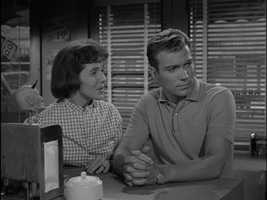 Starring the talented young William Shatner as a superstitious man who becomes fixated on a fortune-telling machine in a local diner, "Nick of Time" is one of those great scripts that requires absolutely no suspension of disbelief or magical intervention. The story exists completely within the framework of our own humanity, and consequently, it is powerfully effective. Don Carter (Shatner) has become convinced that this tabletop device is predicting his future, and its vague answers to his "yes or no" questions only serve to reinforce that belief. Is it really foretelling the future, or is it all in his mind ... or, as this episode eloquently suggests, does it even matter? The story is tight, and the performances of Shatner and Patricia Breslin (as his wife) are fantastic, selling a theme that is not confined to the Twilight Zone.
Starring the talented young William Shatner as a superstitious man who becomes fixated on a fortune-telling machine in a local diner, "Nick of Time" is one of those great scripts that requires absolutely no suspension of disbelief or magical intervention. The story exists completely within the framework of our own humanity, and consequently, it is powerfully effective. Don Carter (Shatner) has become convinced that this tabletop device is predicting his future, and its vague answers to his "yes or no" questions only serve to reinforce that belief. Is it really foretelling the future, or is it all in his mind ... or, as this episode eloquently suggests, does it even matter? The story is tight, and the performances of Shatner and Patricia Breslin (as his wife) are fantastic, selling a theme that is not confined to the Twilight Zone.
Mixed in with these two strong episodes and providing a reminder of Serling's considerable ability is one of the show's most memorable and effective stories: "The Eye of the Beholder". Powerfully written and creatively directed, "The Eye of the Beholder" is classic Twilight Zone in the sense that it sets the viewer up and then turns the tables on his own prejudices in the final scenes. Janet Tyler (Maxine Stuart/Donna Douglas) is a deformed freak, undergoing her final surgery to try and repair her face to a form that will not disgust the citizens of the world around her. Wrapped in bandages for most of the episode, Maxine Stuart is faced with a difficult acting challenge, and her performance under the circumstances is remarkable, evoking so much emotion with her changes in speech and simple hand gestures. Adding to the strength of the episode is yet another brilliant score from the master himself, Bernard Herrmann. While the ultimate revelation of "The Eye of the Beholder" (originally titled "The Private World of Darkness") is now ingrained in popular culture, it still remains effective in its message even today.
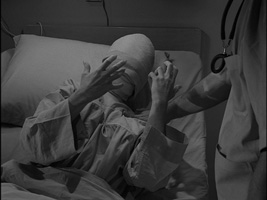 Following these three very strong episodes, the series once again falls into a rut with 6 of the next 7 episodes penned by Serling and not a single one being particularly good. The previously mentioned "The Lateness of the Hour" starts the run and, after a somewhat engaging episode from E. Jack Neuman called "The Trouble with Templeton" about leaving your past where it belongs, it follows with "A Most Unusual Camera". Two criminals have stumbled upon a camera that takes pictures of the future, and while the premise could be wonderful under the right circumstances, the story stumbles around until its awkward and laughably bad conclusion. "Night of the Meek", another of the videotaped episodes, stars Art Carney as a drunk department store Santa Claus who drinks ostensibly because he is dismayed with all the unhappiness in the world. This is clearly a Christmas card to the viewers, but it was a terrible selection to be videotaped, and the show suffers immensely under the format. Still, Carney gives a wonderful performance in the role, despite the thin script, John Fiedler is enjoyable as always as Mr. Dundee, and the inimitable television legend Burt Mustin -- "a fellow you can trust in" -- adds a touch of class and history that elevates the show to something more tolerable than it probably should be.
Following these three very strong episodes, the series once again falls into a rut with 6 of the next 7 episodes penned by Serling and not a single one being particularly good. The previously mentioned "The Lateness of the Hour" starts the run and, after a somewhat engaging episode from E. Jack Neuman called "The Trouble with Templeton" about leaving your past where it belongs, it follows with "A Most Unusual Camera". Two criminals have stumbled upon a camera that takes pictures of the future, and while the premise could be wonderful under the right circumstances, the story stumbles around until its awkward and laughably bad conclusion. "Night of the Meek", another of the videotaped episodes, stars Art Carney as a drunk department store Santa Claus who drinks ostensibly because he is dismayed with all the unhappiness in the world. This is clearly a Christmas card to the viewers, but it was a terrible selection to be videotaped, and the show suffers immensely under the format. Still, Carney gives a wonderful performance in the role, despite the thin script, John Fiedler is enjoyable as always as Mr. Dundee, and the inimitable television legend Burt Mustin -- "a fellow you can trust in" -- adds a touch of class and history that elevates the show to something more tolerable than it probably should be.
The next three episodes, also by Serling, continue the negative trend. "Dust" tells the tale of an Old West town that is preparing to hang a young man who accidentally killed a little girl while driving his wagon in a drunken stupor. The local businessman/swindler Sykes (Thomas Gomez) offers to sell the man's father some magic dust that will turn hatred into love and save the young man's life. There is some merit to the concept, and Gomez is entertaining in his role (as he was previously in the episode "Escape Clause"), but for the most part, the story is lethargic and uninvolving. "Back There" follows with one of the season's numerous time travel stories. Russell Johnson returns (previously in "Execution") as Peter Corrigan, a man involved in a theoretical discussion of time travel with the fellow card-players at his gentleman's club. Suddenly, without any explanation, he is transported to April of 1865 and attempts to prevent the assassination of President Lincoln. Dramatically, the episode falls completely flat, as it is simply one series of contrivances following another, and it is a waste of an interesting premise. It is also a waste of a strong musical score, as Jerry Goldsmith's work on this episode, as well as "Dust", is lost amidst the poor storytelling.
This run of mediocrity concludes with one of the worst episodes of the entire series: "The Whole Truth". Jack Carson stars as Harvey Hunnicut, a used car salesman who will do anything to make a buck. His life changes, however, when he purchases an old Model A that magically forces its owner to always tell the truth. This 3-minute gag is stretched for an entire episode, and it never works. On top of that, it is yet another of the videotaped efforts, and to say it looks and sounds like garbage would be a compliment. Nothing in this episode works on any level, and it nosedives to an eye-rollingly bad conclusion when it is revealed to whom Hunnicut ultimately sells this magical car.
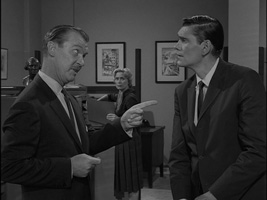 After this painfully bad stretch of episodes, Richard Matheson once again steps up to the plate with a strong script in "The Invaders". Another classic episode that turns the viewer's expectation on its ear, "The Invaders" is a one-woman show featuring an impressive performance Agnes Moorhead as a woman whose home is invaded by a tiny spaceship and little creatures who bombard her with an array of weaponry. Moorhead's grunting gets a bit annoying at times, and the special effects are pretty silly, but the story itself is strong, and it is assisted well by creative direction from Douglas Heyes and yet another wonderful score from Jerry Goldsmith. Matheson himself has always been critical of the episode pointing out that it fails to capture the level of suspense he envisioned in the story, and I have to agree with that assessment. Still, the conclusion is great, and it proves to be one of the better efforts of this season.
After this painfully bad stretch of episodes, Richard Matheson once again steps up to the plate with a strong script in "The Invaders". Another classic episode that turns the viewer's expectation on its ear, "The Invaders" is a one-woman show featuring an impressive performance Agnes Moorhead as a woman whose home is invaded by a tiny spaceship and little creatures who bombard her with an array of weaponry. Moorhead's grunting gets a bit annoying at times, and the special effects are pretty silly, but the story itself is strong, and it is assisted well by creative direction from Douglas Heyes and yet another wonderful score from Jerry Goldsmith. Matheson himself has always been critical of the episode pointing out that it fails to capture the level of suspense he envisioned in the story, and I have to agree with that assessment. Still, the conclusion is great, and it proves to be one of the better efforts of this season.
George Clayton Johnson, who had previously written a few stories for the show but had yet to script his own teleplay, makes his introduction to the series with "A Penny For Your Thoughts". Starring the always solid Dick York (returning from "The Purple Testament"), this episode is played largely for comedic effect and sentimental value, and it works incredibly well. Hector B. Poole (York) is a banker who miraculously flips a coin into the box of a newspaper salesman that lands on its edge without falling over. While the how and why of the result is never explained, this event gives Poole the ability to read the thoughts of others, a skill he at first embraces but quickly would like to disappear. With a great performance from York as well as a compassionate supporting effort from June Dayton, it proves a sweet diversion from many of the heavier episodes.
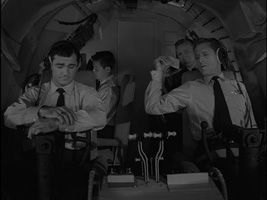 Serling returns to the forefront with three more episodes, two of which are mostly forgettable. "Twenty-Two" stars Barbara Nichols as a woman who is haunted by a foreboding nightmare about being led to a morgue in Room 22. The concept of the story is really quite interesting, but it is another of the videotaped episodes, and the poor editing mixed with the annoyingly loud and repetitive use of stock CBS music destroys the episode. One bright spot is a few brief shots of Arlene Martel, now immortalized as the cold-hearted T'Pring. "Mr. Dingle, The Strong" is also largely forgettable. While it stars Burgess Meredith and Don Rickles, two very talented individuals, the characterization is very one-dimensional, and the story is largely uninvolving.
Serling returns to the forefront with three more episodes, two of which are mostly forgettable. "Twenty-Two" stars Barbara Nichols as a woman who is haunted by a foreboding nightmare about being led to a morgue in Room 22. The concept of the story is really quite interesting, but it is another of the videotaped episodes, and the poor editing mixed with the annoyingly loud and repetitive use of stock CBS music destroys the episode. One bright spot is a few brief shots of Arlene Martel, now immortalized as the cold-hearted T'Pring. "Mr. Dingle, The Strong" is also largely forgettable. While it stars Burgess Meredith and Don Rickles, two very talented individuals, the characterization is very one-dimensional, and the story is largely uninvolving.
In contrast to the lack of involvement of the previous episodes, Serling's script for "The Odyssey of Flight 33" is very engaging. Again relying on time travel (a borderline obsession for Serling at this point), this episode focuses more on the reactions of these ordinary characters to a most extraordinary situation. John Anderson (previously in "A Passage For Trumpet") anchors the episode with a subdued and effective performance, and it does a strong job building tension largely from the dialogue between a few characters confined to an airline cockpit.
With two-thirds of the season behind them, Charles Beaumont takes center stage with three straight episodes credited to him (I use this phrasing since William Idelson originally wrote "Long Distance Call" and asserts that almost nothing was contributed by Beaumont other than his name). The first of these episodes is "Static", a videotaped effort that succeeds in spite of the dreadful quality of the video and editing. Ed Lindsay (Dean Jagger) is a bitter man living in a retirement home who abhors television and longs for the days of his youth when radio was the dominant form of broadcast entertainment. In contrast to "The Trouble with Templeton", an episode that presents the perspective that you can ruin your current life by focusing too much on your past, "Static" offers the thought that sometimes you can find comfort in the joys of the past. Jagger's strong performance is offset nicely by sentimental and compassionate work by Carmen Matthews and Robert Emhardt, and it is surprisingly effective for a videotaped effort.
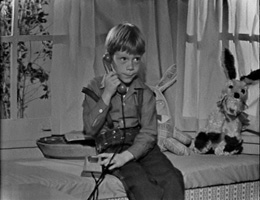 Another videotaped episode that works well is "Long Distance Call", a creepy tale that transcends the terrible way in which it was filmed with great performances from Bill Mumy and Lili Darvas. Darvas plays Mumy's grandmother, and after passing away, she is able to communicate with the child from beyond the grave with a toy telephone. Darker than most and the kind of disturbing tale you would expect someone like Beaumont to embrace, "Long Distance Call" presents the horrifying prospect of a grandmother leading her grandson to commit suicide so they can be together in the afterlife. Thankfully, this is the last of the videotaped experiment, an overall failure that would not return.
Another videotaped episode that works well is "Long Distance Call", a creepy tale that transcends the terrible way in which it was filmed with great performances from Bill Mumy and Lili Darvas. Darvas plays Mumy's grandmother, and after passing away, she is able to communicate with the child from beyond the grave with a toy telephone. Darker than most and the kind of disturbing tale you would expect someone like Beaumont to embrace, "Long Distance Call" presents the horrifying prospect of a grandmother leading her grandson to commit suicide so they can be together in the afterlife. Thankfully, this is the last of the videotaped experiment, an overall failure that would not return.
The last episode in this Beaumont triumvirate was originally a short story by the aforementioned George Clayton Johnson entitled "The Prime Mover". Buddy Ebsen appears as the second "Hillbilly" of the season in the role of a quiet man with a telekinetic power to affect the motion of objects. When his friend Ace Larson (Dane Clark) learns of this power, he becomes drunk with the gambling possibilities and loses all perspective on the rest of his life. While not the greatest of stories, it works fairly well as a cautionary tale, and Ebsen's performance is very likeable with his easy demeanor and down-home charm.
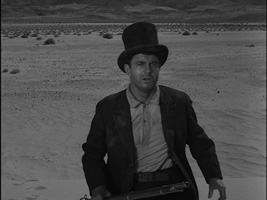 Buffered by the work of fellow contributors, Serling would write 6 of the final 7 episodes of the season, each of which featuring a strength of story and character that was missing in so many of the other episodes. The first two down the homestretch could best be described as "time travel in the desert". "A Hundred Yards Over the Rim" stars Cliff Robertson as Christian Horn in a fantastic performance as a pioneer on a dying wagon train who is magically transported to 1961. While little more than the standard time travel story, the focus on Horn's character elevates the show to a highly effective piece of dramatic television. Horn is an intelligent man, not the typical time traveling buffoon, and he expresses a rational disbelief of his situation without straying into the laughable disconnect so often seen in these stories. His progression is logical, and while he does not understand what is happening to him, he accepts his surroundings for what they are. Of note, this episode features a powerful score by Fred Steiner that enhances the episode even more.
Buffered by the work of fellow contributors, Serling would write 6 of the final 7 episodes of the season, each of which featuring a strength of story and character that was missing in so many of the other episodes. The first two down the homestretch could best be described as "time travel in the desert". "A Hundred Yards Over the Rim" stars Cliff Robertson as Christian Horn in a fantastic performance as a pioneer on a dying wagon train who is magically transported to 1961. While little more than the standard time travel story, the focus on Horn's character elevates the show to a highly effective piece of dramatic television. Horn is an intelligent man, not the typical time traveling buffoon, and he expresses a rational disbelief of his situation without straying into the laughable disconnect so often seen in these stories. His progression is logical, and while he does not understand what is happening to him, he accepts his surroundings for what they are. Of note, this episode features a powerful score by Fred Steiner that enhances the episode even more.
"The Rip Van Winkle Caper" further accentuates Serling's reliance on time travel stories, as four men steal a million dollars in gold and then induce a form of suspended animation for a hundred years on the assumption that when they awaken no one will be looking for them or the gold. It's a flimsy premise, but the story is less about the time travel itself and more about the way avarice affects the human personality. Oscar Beregi delivers an interesting performance as the ringleader of the group, and in typical Twilight Zone fashion, the ultimate conclusion gives an ironic twist to the whole tale.
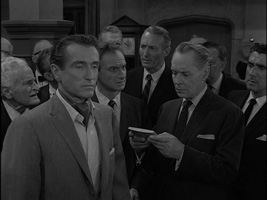 Serling's script for "The Silence" has been criticized by some that say it does not fit The Twilight Zone, but I find that reaction to be an oversimplification of what the show is truly about. In this episode Jamie Tennyson (Liam Sullivan) is an obnoxious loudmouth who daily irritates everyone at the snobby gentleman's club he frequents. One day, tiring of the annoyance, Colonel Archie Taylor (Franchot Tone) bets the man $500,000 that he cannot be silent for one year. Tennyson, in desperate need of the money, accepts. Like "Nick of Time" or "Where is Everybody?", there is no magical element at play here; however, unlike those other episodes, there isn't even the implication of such activities. This is simply a character drama and a very good one at that.
Serling's script for "The Silence" has been criticized by some that say it does not fit The Twilight Zone, but I find that reaction to be an oversimplification of what the show is truly about. In this episode Jamie Tennyson (Liam Sullivan) is an obnoxious loudmouth who daily irritates everyone at the snobby gentleman's club he frequents. One day, tiring of the annoyance, Colonel Archie Taylor (Franchot Tone) bets the man $500,000 that he cannot be silent for one year. Tennyson, in desperate need of the money, accepts. Like "Nick of Time" or "Where is Everybody?", there is no magical element at play here; however, unlike those other episodes, there isn't even the implication of such activities. This is simply a character drama and a very good one at that.
Charles Beaumont's final episode for this season is one of his more creative efforts. "Shadow Play" begins with the murder trial of Adam Grant (Dennis Weaver), who is found guilty and sentenced to death by the electric chair. His response to this result? Maniacal laughter. For, you see, this whole event is a nightmare, his nightmare, and when these people kill him, they will be the ones to die, since he will wake up and stop dreaming ... or so he says. This episode hinges heavily on the performance of Weaver and the skilled direction of Brahm, and it works to perfection. The only real drawback to this episode is the reuse of the annoying stock music from "Twenty-Two". Fortunately, it's used in a much more subdued capacity and does not distract nearly as much as it could have. This latest run of episodes gets back to the heart of where The Twilight Zone finds most of its success: engaging character development.
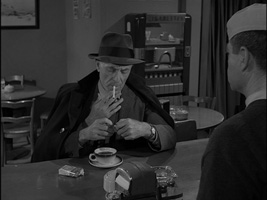 Taking a rare step into the world of comedy, Serling hired comedian Shelley Berman for the role of Archibald Beechcroft in "The Mind and the Matter". Beechcroft is a cantankerous man, who bemoans all his interactions with the people in his life and the stifled nature of his existence. At the suggestion of a fellow employee, he reads a book on the occult that teaches him how to control his own surroundings, and that's precisely what he does, finding the peace and quiet for which he has desired for so long. Berman is quite humorous in the role, and while the episode fails under some terrible special effects and some awkward dialogue Beechcroft has with himself, it is an overall successful episode and a reminder that sometimes you can have too much of a good thing.
Taking a rare step into the world of comedy, Serling hired comedian Shelley Berman for the role of Archibald Beechcroft in "The Mind and the Matter". Beechcroft is a cantankerous man, who bemoans all his interactions with the people in his life and the stifled nature of his existence. At the suggestion of a fellow employee, he reads a book on the occult that teaches him how to control his own surroundings, and that's precisely what he does, finding the peace and quiet for which he has desired for so long. Berman is quite humorous in the role, and while the episode fails under some terrible special effects and some awkward dialogue Beechcroft has with himself, it is an overall successful episode and a reminder that sometimes you can have too much of a good thing.
Venturing once more into comedy, the penultimate episode of the second season was originally called "Nobody Here But Us Martians", a fantastic title with a great double meaning. A decent replacement, the actual episode aired under the name "Will the Real Martian Please Stand Up?", and it featured many great performances, including a third turn for Barney Phillips (previously in "The Purple Testament" and "A Thing About Machines"). On a snowy night in a remote town near a lone diner, a UFO appears to land; and upon examination, the authorities find that the number of patrons waiting for the storm to clear is off by one, but which of them is the Martian? Or is there a Martian at all? Thematically related to "The Monsters are Due on Maple Street", this episode takes a lighter tone and is a light-hearted tale that serves as a good break before the much more weighty finale.
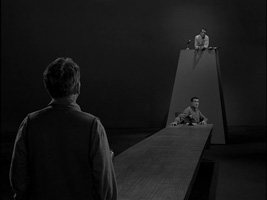 Closing the season is Serling's social commentary on conformity and perhaps in some ways a lashing out at the censorship he often faced in his career. Fritz Weaver returns (previously "Third From the Sun") alongside Burgess Meredith ("Time Enough at Last" and "Mr. Dingle, the Strong") in a dramatic two-person piece that portrays a futuristic "state" where God has been proven to not exist (and therefore religion is banned), and books have been judged obsolete. As a librarian, Romney Wordsworth (Meredith) has also been judged "obsolete" by the state and sentenced to execution for his inability to contribute. With clever set design and camerawork, and strong performances by Weaver and Meredith, "The Obsolete Man" succeeds in spite of its heavy-handed and obvious approach. While the closing scenes are a bit over the top, the message is sound, and it's a good way to close the door on this season.
Closing the season is Serling's social commentary on conformity and perhaps in some ways a lashing out at the censorship he often faced in his career. Fritz Weaver returns (previously "Third From the Sun") alongside Burgess Meredith ("Time Enough at Last" and "Mr. Dingle, the Strong") in a dramatic two-person piece that portrays a futuristic "state" where God has been proven to not exist (and therefore religion is banned), and books have been judged obsolete. As a librarian, Romney Wordsworth (Meredith) has also been judged "obsolete" by the state and sentenced to execution for his inability to contribute. With clever set design and camerawork, and strong performances by Weaver and Meredith, "The Obsolete Man" succeeds in spite of its heavy-handed and obvious approach. While the closing scenes are a bit over the top, the message is sound, and it's a good way to close the door on this season.
Finishing with 29 episodes, the second season of The Twilight Zone gave hint to the thinning quality of the scripts and Serling's inability to keep pace having to write so much material in a short period of time. Thankfully, the work of Beaumont, Matheson, and Johnson is stellar and with the help of a few excellent scripts by Serling himself, the season is more of a success than a failure.
PRESENTATION:
This "definitive edition" of the second season of The Twilight Zone is presented very much like the first season. One notable change is that the individual slimcases have been drastically improved in their design. Instead of a cheap round knob of plastic holding each dist, there is a legitimate clasping mechanism to keep the disc in place. In addition, the case itself is sturdier and does not bow in the middle like the previous effort.
Once again, the episodes are presented in their entirety with every second of possible footage thrown onto the DVDs. With more sponsors than the first season and more advertising potential, there is considerably larger variety to the CBS promotional spots at the end of the episodes, and in the billboard section on Disc 5, the footage from the sponsors has increased tenfold. Much like the previous release, this DVD package is an absolute time capsule to 1960-1961, and it is a delight to experience. Even the material from the latter episodes where Serling blatantly pimps Oasis cigarettes has been included.
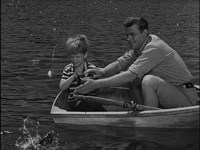 | 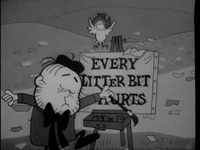 | 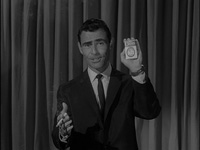 |
Like the original broadcasts, this second season release is in a 4:3 aspect ratio with a mono audio track. As before, the episodes have been re-mastered with, in many cases, staggeringly improved results. One difference is the 6 videotaped episodes. To be blunt, they looked like ass when they originally aired, they looked like ass when released by Image the first time, and they look like ass today. However, to my surprise, while there was very little that could be done to improve these aging relics, there has in fact been an improvement, even if it is not the high quality found in the filmed re-masters. One disappointment comes with "A Penny for Your Thoughts" where the audio is poor for most of the episode, but save the videotaped episodes, the rest of the audio is more than adequate.
Again, the screenshots do not do justice to the difference, but I will share them anyway. In the first, observe how washed out the bobble-head is, particularly the jewel eye and lower right front tooth. In the second, note the checkered shirt, the watch, the hair on Ace's hand, the facial features, the coat, hell, everything. As mentioned, the videotaped episodes only saw a small level of improvement, but even so, check out Burt's scarf and subtle details in the facial features of the characters. Of note, the original releases seem to have zoomed in the frame a bit, accounting for the slight differences in reference.
| Old | New |
|---|---|
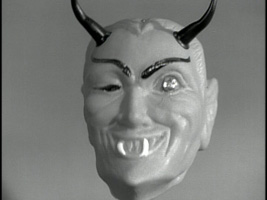 | 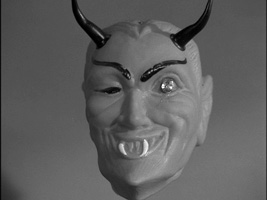 |
| Old | New |
|---|---|
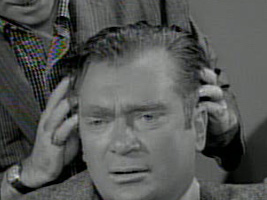 | 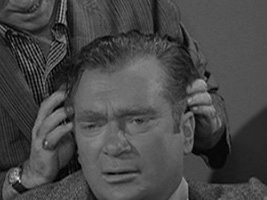 |
| Old (videotape) | New (videotape) |
|---|---|
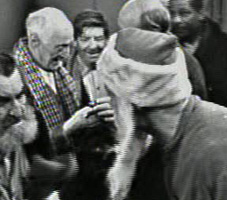 | 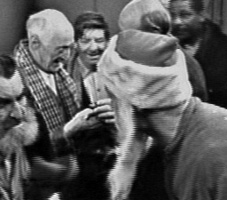 |
| And for anyone wondering if my assessment of the videotaped episodes is unfair (I know the episode is called "Static", but that's a bit too literal for my tastes), the moments captured here are brief but all too frequent: | |
| The Whole Truth | Static |
|---|---|
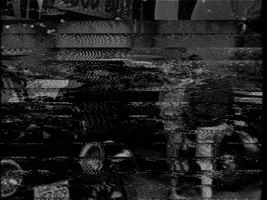 | 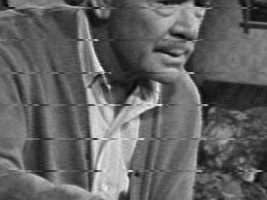 |
The menus are organized in the same simple format as the first season. The montage of the series' classic moments runs once in the background of the main menu, and everything is easily selectable from the start. Each episode's menu has a scene selection screen that is well organized as well as a link to special features. Still missing is a "Play All" feature, but that is a minor oversight in an otherwise great layout.
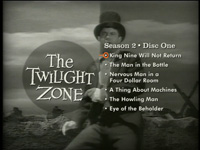 | 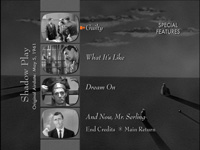 | 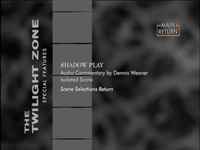 |
WHISTLES & BELLS:
This release of the second season includes mostly the same style of features as the first release: audio commentaries from stars and directors, recently produced radio dramas, excerpts from Marc Scott Zicree's interviews when researching his book The Twilight Zone Companion, and isolated scores from various composers. One notable absence is any more material from the Rod Serling lectures at Sherwood Oaks College. This was one of the better inclusions on the first release, so it is disappointing that there is no more material presented here.
COMMENTARIES
Included on this release are 5+ audio commentaries. The first is from Donna Douglas and accompanies the episode "The Eye of the Beholder". Her comments about Serling are very complimentary, and she understands why she was not ready to perform the scenes underneath the bandages. While she talks some about the specific episode, she goes more in depth on her own career and how it came about that she started working with animals. While not overly insightful, it's a nice commentary, and ends it with the humorous use of her most famous catch phrase.
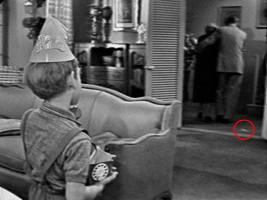 The second commentary supposedly comes from Don Rickles, but either I am missing a joke, or there is something technically wrong with the disc in my set, because it only lasts 3:19 and is awkwardly aborted. It sure sounds like Rickles is preparing to share some interesting information, but at present I have no idea what it might be.
The second commentary supposedly comes from Don Rickles, but either I am missing a joke, or there is something technically wrong with the disc in my set, because it only lasts 3:19 and is awkwardly aborted. It sure sounds like Rickles is preparing to share some interesting information, but at present I have no idea what it might be.
"Long Distance Call" is assisted by two individuals, star Bill Mumy and writer William Idelson. It is by far the best commentary on the set, as Mumy is fascinating to listen to. He not only has a fondness for the show and a solid memory of all the events involved with its production, but he is very adept at conveying his thoughts to the audience in an interesting way as well as interacting with his co-commentator. Perhaps a lifetime spent addressing legions of science fiction fans on the convention circuit has prepared him for such a task. Mumy is mockingly critical of the videotaped episodes, even going so far as to expose a "mark" that got caught in one of the shots. An effective aspect of the production of this commentary is that Mumy's comments come from the left speaker, while Idelson's come from the right. It adds a great frame of reference, so the viewer is never left wondering which one of them is speaking at a given time. On Beaumont's credit for his script, Idelson relays a piece of advice given to him early in his career: "The only way to get started is to let someone take advantage of you."
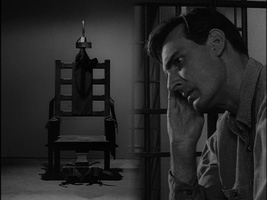 Cliff Robertson provides the commentary for "A Hundred Yards Over the Rim", and it is also a very engaging listen. He talks extensively about the approach he took to the character and the notes and suggestions he made before shooting even began. Like others, he also marvels at how impressive this new transfer looks. Also like others, he takes significant amounts of time to talk about his own career, particularly his experience with the Actors Studio. One interesting observation he makes about the experience is that he is an old man looking deep into his past (watching this old episode), and yet the episode itself is about a young man who is lost far in the future.
Cliff Robertson provides the commentary for "A Hundred Yards Over the Rim", and it is also a very engaging listen. He talks extensively about the approach he took to the character and the notes and suggestions he made before shooting even began. Like others, he also marvels at how impressive this new transfer looks. Also like others, he takes significant amounts of time to talk about his own career, particularly his experience with the Actors Studio. One interesting observation he makes about the experience is that he is an old man looking deep into his past (watching this old episode), and yet the episode itself is about a young man who is lost far in the future.
"Shadow Play" is given analysis by its star, Dennis Weaver. It is somewhat of an odd listen as Weaver discusses his enduring belief in the cyclical nature of the Universe and reincarnation, which incidentally are the reasons why he took the job for this episode. Interestingly enough, he says he never even met Rod, and most of his presentation is about his career outside of the show.
The final commentary comes from Shelley Berman for "The Mind and the Matter", and it is delightfully coherent and thorough. Berman speaks at length about his own process as an actor and a comedian, both with regard to the show and elsewhere, and there is hardly any dead time. On the whole, these commentaries are more interesting than the batch presented on the first season, and if nothing else, viewers should definitely check out those for "Long Distance Call", "A Hundred Yards Over the Rim", and "The Mind and the Matter".
RADIO DRAMAS
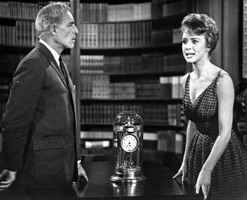 6 more radio dramas have been included with this set with mixed results. The first is for "Nervous Man in a Four Dollar Room" (38:31) starring Adam Baldwin. The characterization is changed a bit to make Jackie seem more like a plain old-fashioned "nice guy" instead of the bumbling fool he is made out to be in the original episode. This change doesn't really fit the rest of the episode and sets it off on an awkward tone. Also changed is the ultimate resolution, which is more or less an effective alternate interpretation. That said, Adam Baldwin's performance is very solid and helps carry what is essentially a one-man piece.
6 more radio dramas have been included with this set with mixed results. The first is for "Nervous Man in a Four Dollar Room" (38:31) starring Adam Baldwin. The characterization is changed a bit to make Jackie seem more like a plain old-fashioned "nice guy" instead of the bumbling fool he is made out to be in the original episode. This change doesn't really fit the rest of the episode and sets it off on an awkward tone. Also changed is the ultimate resolution, which is more or less an effective alternate interpretation. That said, Adam Baldwin's performance is very solid and helps carry what is essentially a one-man piece.
"The Lateness of the Hour" (40:38) stars Jane Seymour in the lead role of the daughter Jana, and it is an odd choice indeed. While Seymour's beauty completely defies her age, she's still well over 50 years old, and her voice betrays that fact, and it doesn't really work for the role of a young and vibrant girl in her twenties. Still, save that flaw, she's a very talented performer, and if you can get past the association, she gives a pretty impressive performance. The original script for the episode is derivative and uninspired, but the adaptation makes some serious improvements, fleshing out numerous details of the characters and the story. It still isn't particularly great, but it is far better than the original.
"The Odyssey of Flight 33" (35:45) was an impressive character piece on the television series, but the radio drama presented here is overly adapted and incredibly annoying. It's as it the producers are trying to play if for comedic effect, and it is very awkward. Instead of presenting human characters reacting to an extraordinary situation, it's just annoying caricatures plodding through the lines of a script.
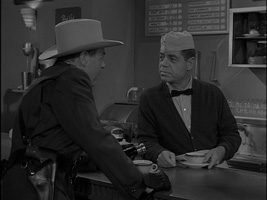 The next radio drama, "A Hundred Yards Over the Rim" (36:03) is based on one of the better character performances during the show's run, so it's hard to imagine this adaptation could recapture that quality. Jim Caviezel stars in the lead role, and instead of presenting a character with intelligent skepticism, he plays it more like a bumbling fool entranced by them thar future like machine thingies, going so far as to demand the owner of a jukebox release the poor man cooped up inside it playing the music. On top of this, the story is drawn out entirely too long, adding weak comedy between a trucker and the nurse, and the whole effort, including some overwritten speechifying at the end, is a failure lacking the subtlety and strength of the original.
The next radio drama, "A Hundred Yards Over the Rim" (36:03) is based on one of the better character performances during the show's run, so it's hard to imagine this adaptation could recapture that quality. Jim Caviezel stars in the lead role, and instead of presenting a character with intelligent skepticism, he plays it more like a bumbling fool entranced by them thar future like machine thingies, going so far as to demand the owner of a jukebox release the poor man cooped up inside it playing the music. On top of this, the story is drawn out entirely too long, adding weak comedy between a trucker and the nurse, and the whole effort, including some overwritten speechifying at the end, is a failure lacking the subtlety and strength of the original.
"Will the Real Martian Please Stand Up?" (35:55) takes a different approach to its lead character, this time starring Richard Kind as the obnoxious Boston businessman. Kind was born to play this type of character, and it is quite effective. FOr an episode that relies pretty heavily on a visual finale, the writers have found a unique way to capture a similar style with this audio presentation.
The final radio drama on this set stars Jason Alexander as Wordsworth in "The Obsolete Man" (38:51). In the original, Burgess Meredith gives a masterful performance, and Alexander simply is no up to this task. Additionally, the script has been substantially rewritten, making it even more preachy and self-involved than the televised episode, rendering it completely ineffective.
INTERVIEWS
In this second season, there is almost twice as much interview material as the first release, much of it coming from directors Buzz Kulik and Douglas Heyes. These are continuations of the same interview material featured on the first set and come from Marc Scott Zicree's personal research into his essential textbook for the show.
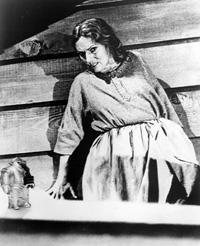 Buzz Kulik directed numerous episodes, and his comments for four of them are included here. On "King Nine Will Not Return" (12 mins), he talks about his friendship with Serling from their days in New York and how he wanted to do the show in the first season but simply was not available at the time. He gives some insight to the location shots for the episode and how they achieved various effects. He returns again for about 8 minutes on "The Trouble With Templeton", which he calls one of his favorite pieces of work from his entire career. He laughs and says that the annoying director's Southern accent was inspired by a director with whom he and Sydney Pollack had worked and did not like. On "Static" (10 mins), he speaks about the experience of doing a videotaped episode and how it was easier for him than most because of his experience in live television. Finally, Kulik adds insight to "A Hundred Yards Over the Rim" (8 mins), an episode of which he was particularly fond. Of note, this interview is one of the few times when Zicree actually contributes some meaningful analysis to the discussion instead of simply grunting in approval at everything the interviewee says.
Buzz Kulik directed numerous episodes, and his comments for four of them are included here. On "King Nine Will Not Return" (12 mins), he talks about his friendship with Serling from their days in New York and how he wanted to do the show in the first season but simply was not available at the time. He gives some insight to the location shots for the episode and how they achieved various effects. He returns again for about 8 minutes on "The Trouble With Templeton", which he calls one of his favorite pieces of work from his entire career. He laughs and says that the annoying director's Southern accent was inspired by a director with whom he and Sydney Pollack had worked and did not like. On "Static" (10 mins), he speaks about the experience of doing a videotaped episode and how it was easier for him than most because of his experience in live television. Finally, Kulik adds insight to "A Hundred Yards Over the Rim" (8 mins), an episode of which he was particularly fond. Of note, this interview is one of the few times when Zicree actually contributes some meaningful analysis to the discussion instead of simply grunting in approval at everything the interviewee says.
Douglas Heyes is back for more with 5 interviews on this set, the first with "Nervous Man in a Four Dollar Room" (3.5 mins) where he briefly discusses how they achieved the rear projection effect. On "The Howling Man" (14:40), he talks at length about the unique camerawork and how they accomplished the character transition. He also talks about his creative differences with Beaumont over how the character should be presented to the audience. In my opinion, Beaumont's plan was superior, but Heyes's choice to have the crosses replaced with staffs was a wise one, so it's a draw. On "The Eye of the Beholder", he is back for 15 more minutes of discussion on how they chose to film the episode to achieve the specific effect for the final act. On "Dust" (8.5 mins), he has very little to say and admits that he wasn't particularly fond of the episode. Finally, on "The Invaders" he talks for almost 18 minutes about the approach to the episode. He notes that Agnes Moorhead had studied with Marcel Marceau and was therefore perfect for the role. Some of the more interesting material from this interview is his descriptions of the typical Twilight Zone shooting schedule.
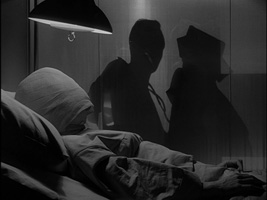 Maxine Stewart is also interviewed with relation to "The Eye of the Beholder" (11 mins), and almost all of her comments seem inaccurate. She says that she looped the audio for Donna Douglas, which clearly is not true, and she says that's the only looping in the episode, which also is obviously not true (there is a long scene of obviously dubbed dialogue midway through and a clear acoustic shift in the recording). Finally, she emphatically asserts that she wasn't in Hollywood when Zicree "claims" the episode was filmed. It's an odd listen.
Maxine Stewart is also interviewed with relation to "The Eye of the Beholder" (11 mins), and almost all of her comments seem inaccurate. She says that she looped the audio for Donna Douglas, which clearly is not true, and she says that's the only looping in the episode, which also is obviously not true (there is a long scene of obviously dubbed dialogue midway through and a clear acoustic shift in the recording). Finally, she emphatically asserts that she wasn't in Hollywood when Zicree "claims" the episode was filmed. It's an odd listen.
George Clayton Johnson is interviewed for 13 minutes and it's presented with his episode "A Penny For Your Thoughts". Apparently he was friends with a great deal of writers and critiqued television writing all the time, but never actually considered writing himself until The Twilight Zone came along. He says that in the original script, the coin was just a metaphor for a man caught on the edge, but they added a physical coin before shooting, and he was pleased with the result. This interview is worth listening to if only to hear his concept for one of the episodes of a series version of this particular episode.
Finally, Bob Sering, Rob's brother, adds insight with "The Odyssey of Flight 33". This interview segment runs 23-and-a-half minutes and only tangentially relates to the actual episode. There is all kinds of commotion going on in the background, making it difficult to concentrate on the discussion at times, but there is a wealth of information about Rod's childhood and their experiences together, and if you're searching for one interview segment to give a listen, this is certainly the most in-depth and informative.
ISOLATED SCORES
The final significant extra features are the isolated scores for 22 of the 29 episodes! Like the previous set, pretty much every episode that wasn't scored with stock CBS music is presented as an alternate track on the discs, including some of the stock music as well. This is a wonderful treat for fans of this unique art form, and the great work of Fred Steiner on "King Nine Will Not Return" and "A Hundred Yards Over the Rim" is included as well as Jerry Goldsmith's score for "The Invaders" and Bernard Herrmann's fantastic work on "The Eye of the Beholder".
OTHER MATERIAL
Although the videotaped episodes are for the most part a black mark on the show, they do provide one brief and insignificant advantage: production slates. 5-second clips of these slates have been included as an extra on each of the respective episodes.
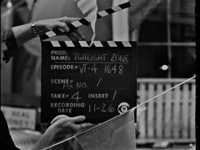 | 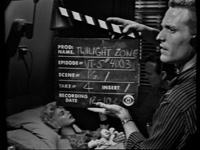 |
"The Eye of the Beholder" was originally called "The Private World of Darkness", and it has been shown in syndication under that title. The alternate credits sequence from this version have been included with the episode. For the episode "Twenty-Two", the script has been included in .pdf format, accessible through a DVD-ROM drive. This scanned version of the script includes numerous notes from Serling on the structure of the episode and the timing of various sequences and how it would be shot to fit into their constraints.
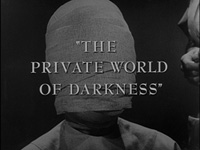 | 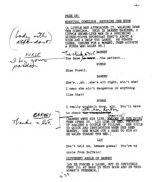 | 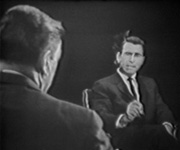 |
The fifth disc includes a few additional features that don't really fit anywhere else. First is the Mike Wallace Interview episode that was also included on the original "Treasures" discs from Image. Recorded in 1959, before The Twilight Zone went on the air, it runs 21 minutes in length and is a fascinatingly in-depth discussion about Serling's motivations and the industry as a whole. It is essential viewing for any fan of the series.
Also included is a clip from the series Tell it to Groucho (15:10). This is an odd piece of television history, where Serling shows up on the famous talk show and introduces Groucho Marx to Batista, a local waiter whom he's heard has a very good singing voice. For almost 10 minutes, Groucho and Batista exchange awkward banter before Serling returns to help compete in a quick game show segment.
A 5 minute clip from The Jack Benny Show rounds out these various segments, and it is probably the most entertaining of the bunch. With the help of Serling, Benny does an hilarious parody of The Twilight Zone with himself as the main character. It's great stuff and a reminder of how wonderful an entertainer Jack Benny truly was.
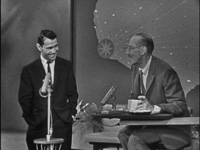 | 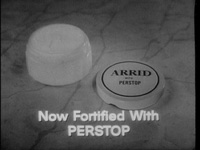 |  |
Finally, there is another comic book in .pdf format, 32 still images from various moments in the second season, and over 6 minutes of advertising billboards from the show's various sponsors. These billboards are hilariously bad at times with some of the worst product names and catchphrases imaginable. "Arrid, now fortified with Perstop!" "Lanolin Enriched Wildroot Cream Oil: Makes hair obey all day! In bottle or tube." And of course, Serling's favorite, Oasis Cigarettes: the smooth, cool feeling you can only find with "Menthol Mist".
CONCLUDING THOUGHTS:
The first season of The Twilight Zone opened up a world that the television audience had never before experienced. It was unique and thought-provoking and the stuff of legend. This second season of the classic show stumbled quite a bit. The glimpses of greatness were still seen, but there were too many episodes that failed completely and just did not measure up to the high standard of the inaugural effort. Still, this second season contains some of the series' best efforts, and while it starts off weakly, it finishes very strong. Also, while this DVD release is not as thorough as the set for the first season, it still contains an unbelievable array of information and material related to the series. I am torn between how to ultimately rate this release, but on the strength of the special features, the high quality re-mastering of the film episodes, and the overall quality of the better episodes, I am going to Highly Recommend it with the caveat that there are some real stinkers in this set and the understanding that it is best suited to longtime fans of the series.
Included in the set are the following episodes:
Disc One
Disc Two
Disc Three |
Disc Four
Disc Five |
|
| Popular Reviews |
| Sponsored Links |
|
|
| Sponsored Links |
|
|
| Release List | Reviews | Shop | Newsletter | Forum | DVD Giveaways | Blu-Ray | Advertise |
|
Copyright 2024 DVDTalk.com All Rights Reserved. Legal Info, Privacy Policy, Terms of Use,
Manage Preferences,
Your Privacy Choices | |||||||









